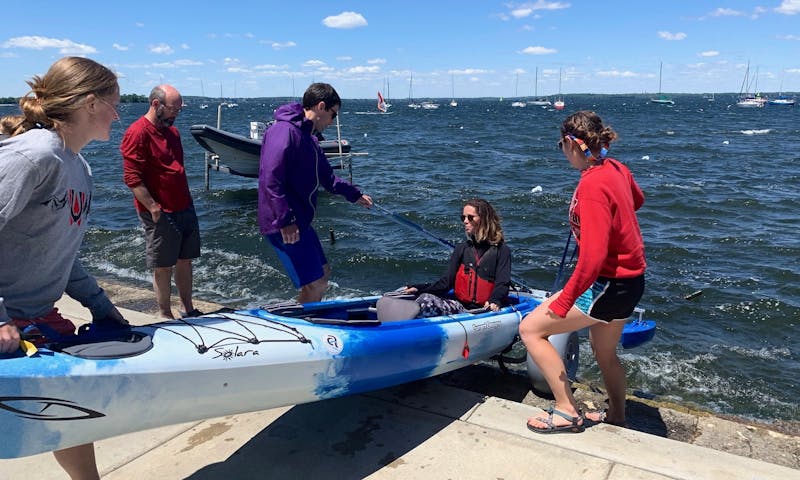
Hoofers Adapt co-chairs Megan Gray and Kathryn Bach are working to make all six Hoofers clubs more accessible to people with diverse abilities.
Image By: Courtesy of Megan Gray
Hoofers Adapt co-chairs Megan Gray and Kathryn Bach are working to make all six Hoofers clubs more accessible to people with diverse abilities.
Image By: Courtesy of Megan GrayWhen Hoofers Ambassadors was being developed last spring to promote diversity and inclusion within Hoofers, Megan Gray and Kathryn Bach had a question: Had the perspective of disability been considered?
Gray and Bach were invited to join in Hoofer Ambassador's development and its sub-communities. From here, they started Hoofers Adapt, a community they co-chair with the goal of making the outdoors accessible to people of all ability levels.
“Hoofers is a large part of this campus that has been around for a really long time and it serves so many people, but it doesn’t right now have structure to serve all people,” Bach said. “All people deserve the right to access the outdoors.”
Hoofers Ambassadors was developed in response to equity concerns regarding the oldest and largest organization on UW-Madison’s campus.
“Hoofer Ambassadors was started to focus on diversity and inclusion within Hoofers and look at people who have been historically excluded from the outdoors in general and try and address this problem,” Gray said.
Gray and Bach believed it was important to elevate the voices of those with diverse abilities in this process.
“Our whole idea for Hoofers Adapt from a very broad, general level is to work within the existing system of Hoofers to make all the different Hoofer events more accessible,” Bach said.
“We are Occupational Therapy students, so we come from this background of inclusion and we are both passionate about the outdoors and feel like all individuals, regardless of their ability level, should have access to these outdoor activities,” Gray said.
Both chairs of Hoofers Adapt understand the concept of occupational justice guides and anchor the community’s growth.
“It’s the idea that anyone, regardless of ability level, should be able to participate in everyday activities,” Bach said.
Groups such as Advocates for Diverse Abilities and Spinal Cord Injury Group were influential in the early development of Hoofers Adapt.
The chairs’ first initiative was to obtain an adapted tandem kayak and receive training on how to safely implement it into water activities. To make this happen, Gray and Bach applied for grant money.
They were able to bring in Kevin Carr, founder of Creating Ability, a company that creates adaptive paddling equipment. Carr travelled from Minnesota to train the leaders of Hoofers Adapt, Hoofer Outing Club and Outdoor UW on how to use the kayak.
“This kayak will allow individuals with diverse abilities to enjoy Lake Mendota in a whole new way,” Gray said.
The kayak includes features such as a supportive seat and outriggers for stability, a chariot-style design with wheels for more accessible water entry, as well as hand and wrist adaptations to assist those who struggle to grip a standard paddle, according to both Creating Ability, as well as Gray and Bach.
Following these trainings, Gray and Bach created a manual and an informational video as a resource for future trainings.
The adapted kayak is not available to the public yet, but Hoofers Adapt hope to make it available by next paddling season.
“This Hoofers initiative shows that UW-Madison is an inclusive community where all people can succeed in outdoor pursuits,” Bach said.
Their goals have not stopped here — Gray and Bach are looking to increase accessibility in all six Hoofer clubs.
“We are working with current club presidents and current trip leaders to make all of these different events across this existing structure more inclusivity-minded,” Gray said.
Their next event will be to take the Mountaineering Club to Boulders Climbing Gym for their adapted climbing clinic on Sunday, Nov. 24. This will provide the group of able-bodied Mountaineering Club members to experience climbing in a new way and open their eyes to the perspective of those with diverse abilities.
“Another thing we talk about is increasing awareness and promoting a culture of thinking about people with other ability levels. It’s almost like building relationships and connecting people,” Gray said. “Hopefully in the future we can plan some of our own events but for now we are kind of serving as connectors.”
One of Gray and Bach’s goals is to collaborate with other groups on campus that focus on increasing accessibility and create more resources for adapting club activities. They hope to spread their message across campus moving forward.
“I think it’s something a lot of people are interested in and not a lot of people know about” Gray said.
Hoofers Adapt has biweekly informal meetings at Memorial Union on Wednesdays. from 6-7 p.m. in Mendota Lounge. Here, anyone interested in accessibility in the outdoors is welcome to join and contribute to the planning of events and discussion of future goals.
The two expressed a desire to ensure increased accessibility in the outdoors persists and continues to grow in the future.
“A big goal of ours is to make sure this information we are providing lasts,” Bach said.